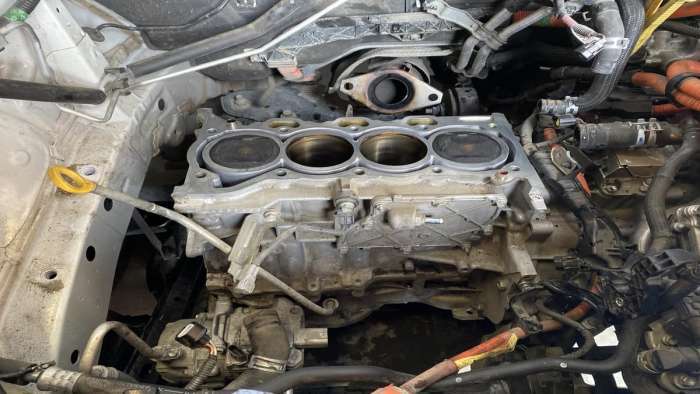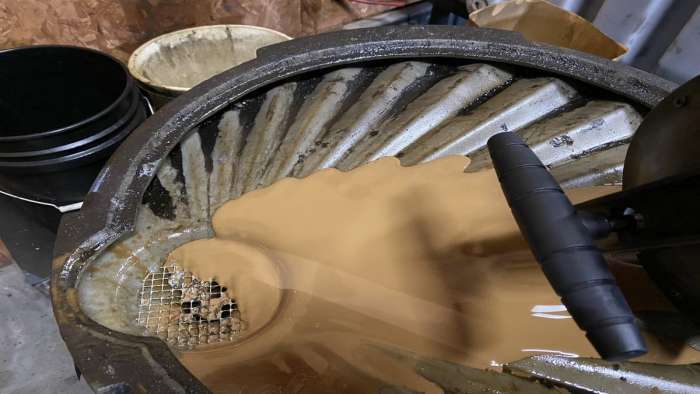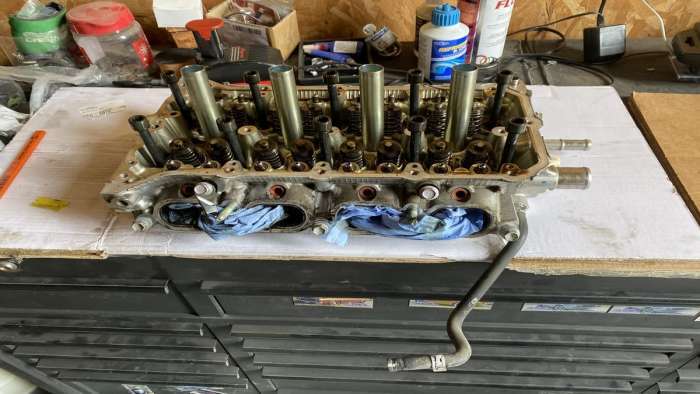Head gasket failure is something no Gen3 Toyota Prius owner ever wants to have happen to them. The repair can be very costly, depending on how long the head gasket has been failing.
I want to cover a few things in this article from how to detect a failing head gasket, to proper repairs and even not so appropriate repairs. We will talk about each repair and why you should also consider changing your engine if left unattended. First, we are going to discuss why the head gasket fails on Gen 3.

Head Gasket Failure On Generation 3 Toyota Prius; Theory On Why It Happens
In a perfect world, our Prius engines would last forever. However, when the EPA and other government entities get involved, we have to add on junk to our engines that are not always beneficial.
Gen 3 Prius had a new engine for the 2010 model year. The engine water pump was now 100% electric, and EGR was back also. The engine was more efficient, and fuel economy numbers were better than the previous generation. All of this was, of course, when the cars were brand spanking new, and no issues were known.
Fast forward a few years later, and we have all sorts of things going on with Prius, including a failing head gasket. The question is, why is it failing, the root cause of it.
Here is my theory. The electric water pump is one of the culprits. The pump failure on Gen 3 Prius is not in the motor portion of the pump. It is in the plastic impeller on the pump that fails. With no coolant flowing, the engine will overheat and cause head gasket failure. But there is also another delinquent here that many are not taking very seriously, that is the EGR system.
The EGR cooler and system can get plugged up with carbon deposits. When this happens, you will get a P0401 EGR Insufficient flow code, and your Prius will not function as designed. The other thing that happens is you are not allowing full pressure to be released from the engine.
Not allowing full pressure release from the engine can cause unnecessary back pressure and overtime contribute to the head gasket weakening and eventually lead to coolant consumption. This process does not happen quickly, which is why many owners will not notice the problem until it is too late.
What Happens When Failure Goes On Too Long
As head gasket failure becomes more prominent, Prius owners will find themselves with misfire trouble codes and the famous rattle/knock on startup.
What is happening here is that too much coolant has leaked into the combustion chamber and the cylinder is not firing correctly. The misfire will quickly clear up once the coolant is pushed out or burned off, but there is another foul force at play here that needs to be taken into account, hydrostatic lock.

If you know much about hydraulics, you will understand that liquids do not compress. As coolant puddles inside the combustion chamber, that liquid, once compressed, is restricting movement inside the engine. That means that as the piston is coming towards the top of the stroke, it is meeting a force that tries stopping it.
When this happens, those forces are transmitted through the connecting rod. Do this hundred if not thousands of times, and you have a recipe for disaster. The connecting rod becomes weakened by this action and eventually will break.
What Can Be Done/What Is The Right Repair?
The pictures I am showing here are of a 2010 Prius with 169,000 miles. The car was running fine, but the owner had complained about the check engine light one time and a weird noise it made.
I checked the stored trouble codes and found that it had a misfire. I also checked the coolant level and found the expansion tank empty. Those are two indicators that we already have a failing head gasket.
I told the owner about the problem and what I thought we should do to prevent putting an engine in it. The owner loved the car and was willing to repair the correct way, though there are other ways to do it. Not all are recommended methods.
There are mostly three repairs that can be done to take care of this issue. I want to explain all of them, starting with my least favorite one, head gasket sealer.
Only sealing off a leaking head gasket is a bandaid repair. Some Prius owners have reported over 100,000 miles of continued use with no further issues. That is great, but what is that stuff doing to your cooling system and components like your water pump?
Some head gasket sealers have the material in them that is abrasive and can cause impeller failure on the pump after a while. When you go to replace the pump, the liquid is then exposed to air and can start "sealing" other parts of the cooling system. This does not always happen, and sometimes you can get away with repairing this way.
I would only say that if you are broke and you just barely started having this the problem, go for it. With leaks in the gasket that are more prominent, I would not use a sealer. With more substantial holes, the sealer cannot build up enough "sealing" area to keep it from happening again.
Next is actual head gasket replacement. This repair is one I would back because you are replacing the failed component with a new one. The old gaskets have been heat-cycled a lot, and the ridges that help seal the combustion chamber have flattened out and allowed for the liquid to pass through.

Installing a new and improved gasket solves the root cause of the problem. There is no question that if you have an engine that has started to consume coolant that this repair will be the best way to go about fixing your Prius.
The last option is a complete engine replacement. I would suggest this option if the engine has been mixing the oil and the coolant. More than likely, the motor has a weak connecting rod, and fixing the head gasket only will now be the band-aid fix.
Conclusion
Each of these repairs for your failing 3rd Gen Prius is acceptable. Depending on your needs and your desire to keep or dump the car. I can tell you that the sooner you repair the issue the right way with a head gasket, the longer your Prius will stay on the road.
Also, if you stay on top of keeping your EGR system clean and replacing the water pump every 120k, you should not see an issue either. Does this happen to every Gen 3 Prius owner? No, and again these are my professional theories that I believe do play a crucial role in engine longevity.
If you want to chat about Prius engine failure, drop me a line on Twitter or Facebook. I am more than happy to help any Prius owner maximize the life expectancy of their car.
Until next time, stay safe, and drive happy. See you in the following story. Save Hundreds On Water Pump Replacement On Your 2010-2015 Prius.
Watch this Toyota Prius truck with a nice little bed and click to subscribe to Torque News Youtube for daily automotive news analysis.
Peter Neilson is an automotive consultant specializing in electric cars and hybrid battery technologies. He holds a Bachelor of Science in Automotive Service Technology from Weber State University. Peter is also an Instructor of Automotive Technology at Columbia Basin College. Peter can be reached on Linkedin and you can tweet him at The_hybrid_guy on Twitter. Find his page on Facebook at Certified Auto Consulting. Read more of Peter's stories at Toyota news coverage on Torque News. Search Toyota Prius Torque News for more in depth Prius coverage from our reporters.
Set as google preferred source












Comments
This is a complete and
Permalink
This is a complete and helpful article Peter. Those of us with older cars, who did our own repairs have done our share of head gasket repairs and replacements. As you mentioned, the repair steps really depend on how early you catch the gasket failure, and what damage is done. Older cork or paper gaskets can sometimes fail just from age, if regular maintenance is not done. The problem compounds if the owner ignores the dashboard warning lights because overheating can warp the engine head, and you can get mixing of oil and water, which can cause improper engine lubrication and other internal engine component failures. I burned a valve in my Honda CR-V at around 135K miles, and it ended up being far less expensive for me to swap out the motor from a low mileage wrecked CR-V instead of replacing the head at a dealership or shop. Some businesses even carry low mileage Japanese imported engines. Japan has a stringent bi-annual "Shaken" inspection, and often they will pull out a perfectly good motor at 40K-50K miles and replace it with a new engine. And you can get those low mileage, tested engines from local importers for a good price. I've bought two of those JDM engines for my Hondas over the years, but happily most of the time you can catch the head gasket failure before any serious damage occurs, and gasket replacement is far easier and cheaper to do.
I'm with you regarding the
Permalink
I'm with you regarding the EGR being a likely suspect behind head gasket failure. But Im not sure about "back pressure" increase. You mean exhaust back pressure? Is the EGR flow rate (when new/clean) that much?
My take: the Toyota engineers are counting on as-new EGR air flow to keep combustion chamber temperatures down. When it's near-fully clogged, combustion chamber temp's climb, stressing everything more than design limits.
Does 2016, Gen 4 Prius has
Permalink
Does 2016, Gen 4 Prius has the same water pump and EGR problems, which could lead to head gasket failure?
When should I change the CVT fluid?
Thank you.
One more thought: if a stop
Permalink
One more thought: if a stop-leak product has been added to the coolant, flushing the system with a 50/50 mix of water and white vinegar, followed by multiple straight water flushes, and finally a refill with Toyota Long Life Coolant, MAY dissolve the goop. Verify first: get some of the chunks (say siphoned out of the reservoir, if possible) and test, drop them into the vinegar/water mix, see if they dissolve. One stop-leak manufacturer has recommended this, and it did work with that product.
I'd suggest Long Life, not Super Long Life, because it's full strength, and you'll have an indeterminate amount of water left in the system. Put in 50% of the coolant system's spec'd capacity (7.6 US qts), then top off with distilled water. Just pouring in 1 US gallon of LLC, would not be excessive.
Then maybe change once more, with Super Long Life Coolant (pre-mixed), after about 2 years.
Should I proactively replace
Permalink
Should I proactively replace water pump and clean egr system?
Interesting article.
Permalink
Interesting article.
Do you think the open deck design contributes to a sensitivity to head gasket failure?
I had an Alfa GTV with a similar design and the French also seemed fond of the design. My Alfa would need a new head gasket with alarming frequency compared to an old Datsun or Mercedes which actually never needed them even after 200k miles. Their blocks did not have an open deck.
You said it from the
Permalink
You said it from the beginning. Once the water pump impeller fails and the engine starts to overheat is when you should fix the issue. Anytime anyone waits too long without repair it just gets worse. Seriously. Waiting until the engine overheats and starts going through coolant, and THEN they wait until the engine starts making noise too replace a "headgasket"?! Kinda silly. Why this is even a question. New headgasket or engine? Might as well get another car since they're clearly not taking care of this one.
How can you tell when the
Permalink
In reply to You said it from the by Luke (not verified)
How can you tell when the engine is "starting to overheat" without a temp gauge? - Thanks
How can you tell when the
Permalink
In reply to You said it from the by Luke (not verified)
How can you tell when the engine is "starting to overheat" without a temp gauge? - Thanks
I have 2014 Prius two at 290
Permalink
I have 2014 Prius two at 290 k miles it started misfire in cylrnder 1 , I cleaned manifold intake , fuel injector , plugs nothing worked and finally used Bars head gasket sealer and that $40 investment solved the problem and now I have driven 10000 miles after that and it's running great so far 299400 miles today .
I own a 2010 Prius. There is
Permalink
I own a 2010 Prius. There is a very common problem with the factory pistons and rings failing after 100k or so and burning oil. I've had the head gasket replaced at the dealer under warranty at 148k, and it did not fix the rattle on startup problem or the oil consumption problem. Toyota knows about these problems. I had to fight to get them to honor their CA emissions warranty for the head gasket but would not do anything about the burning oil problems.
Hi,
Permalink
Hi,
I would suggest that head gasket failure can be caused by owners not changing their engine coolant at Toyota's designated intervals. Or, if the coolant was changed, that it was not replaced with the proper long life coolant. I have seen these cars still in service with 600,000 miles on the clock with the original head gasket.
Change the coolant at 5 years or 60k miles and every 50k miles or 3 years after that. During the coolant service, flush the system with distilled water with the heater on hot. By flush I mean replace the coolant with distilled water, run the car for 30 minutes and then drain it. If the water is is dirty do it again and keep doing it until it is clean. I changed the coolant on used Miata that own shortly after I bought it and I had to flush it 4 times!
Cheers
Mike
Please define "early"
Permalink
Please define "early" generation 3 Toyota Prius. Thanks.
Early is 2010-2014 when
Permalink
In reply to Please define "early" by Bill (not verified)
Early is 2010-2014 when Toyota replaced flawed pistons and piston rings in new production.